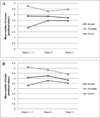Differences in information seeking among breast, prostate, and colorectal cancer patients: results from a population-based survey
- PMID: 20934297
- PMCID: PMC2993788
- DOI: 10.1016/j.pec.2010.09.010
Differences in information seeking among breast, prostate, and colorectal cancer patients: results from a population-based survey
Abstract
Objective: There is much research describing cancer patients' information needs and their use of the Internet, print media, and other sources to fulfill these needs. Yet little is known about whether patients with different types of cancer vary in their information needs and seeking behaviors. This study used population-based data to address this question.
Methods: A sample was randomly drawn from the list of patients with breast, prostate, or colorectal cancer reported to the Pennsylvania Cancer Registry in 2005. Patients completed a mail survey (N=2010); respective response rates were 68%, 64%, and 61%.
Results: Colorectal cancer patients reported consistently less information seeking than breast and prostate cancer patients. Multivariate analyses revealed that differences by cancer type were not explained by sex or other demographics, disease stage, or treatment received. These differences were most pronounced among patients with early stage cancer.
Conclusion: Cancer patients have myriad information needs and use a range of sources to satisfy these needs, but there appear to be important differences in information engagement by cancer type.
Practice implications: Understanding differences in information seeking among disease-specific populations may help guide future patient education and decision making across the care continuum.
Keywords: Breast cancer; Colorectal cancer; Information needs; Information seeking; Prostate cancer.
Copyright © 2010 Elsevier Ireland Ltd. All rights reserved.
Conflict of interest statement
None of the authors has any conflicts of interest to disclose.
Figures

References
-
- Rimer BK, Briss PA, Zeller PK, Chan EC, Woolf SH. Informed decision making: what is its role in cancer screening? Cancer. 2004;101 Suppl 5:1214–1228. - PubMed
-
- Brody DS, Miller SM, Lerman CE, Smith DG, Caputo GC. Patient perceptions of involvement in medical care: relationship to illness, attitudes, and outcomes. J Gen Intern Med. 1989;4:506–511. - PubMed
-
- Pontes MCF, Pontes NMH. Variables that influence consumers’ inferences about physician ability and physician accountability for adverse health outcomes. Health Care Manage Rev. 1996;22:7–20. - PubMed
-
- Chen X, Siu LL. Impact of the media and the Internet on oncology: survey of cancer patients and oncologists in Canada. J Clin Oncol. 2001;19:4291–4297. - PubMed
-
- Eysenbach G, Powell J, Kuss O, Sa ER. Empirical studies assessing the quality of health information for consumers on the World Wide Web. J Amer Med Assoc. 2002;287:2691–2700. - PubMed
Publication types
MeSH terms
Grants and funding
LinkOut - more resources
Full Text Sources
Medical

